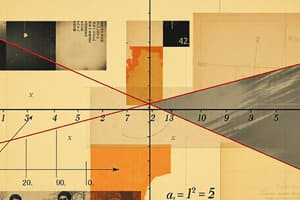Podcast
Questions and Answers
What is one method to solve the equation (𝑥 − 1)(3𝑥 + 2) = 0?
What is one method to solve the equation (𝑥 − 1)(3𝑥 + 2) = 0?
- Set each factor to zero separately (correct)
- Use the Quadratic Formula directly
- Combine the factors on the left side
- Multiply both sides by zero
Which equation represents the product of complex conjugates 𝑎 + 𝑏𝑖 and 𝑎 − 𝑏𝑖?
Which equation represents the product of complex conjugates 𝑎 + 𝑏𝑖 and 𝑎 − 𝑏𝑖?
- 𝑎^2 + 𝑏^2 (correct)
- 𝑎^2 + 2𝑏𝑖
- 𝑎^2 - 𝑏^2
- 𝑎^2 - 2𝑏𝑖
What is the first step to solve a quadratic equation using the Square Root Method?
What is the first step to solve a quadratic equation using the Square Root Method?
- Apply the Quadratic Formula
- Take the derivative of the equation
- Get the squared term on one side (correct)
- Factor the equation
What form does a complex number take?
What form does a complex number take?
What does the √𝑏² − 4𝑎𝑐 represent in the Quadratic Formula?
What does the √𝑏² − 4𝑎𝑐 represent in the Quadratic Formula?
What is the standard equation of a line?
What is the standard equation of a line?
How do you find the x-intercept of a graph?
How do you find the x-intercept of a graph?
What does the slope of a line represent?
What does the slope of a line represent?
Which of these slopes corresponds to a horizontal line?
Which of these slopes corresponds to a horizontal line?
Under what condition are two lines considered parallel?
Under what condition are two lines considered parallel?
What rule describes the operation order in mathematical expressions?
What rule describes the operation order in mathematical expressions?
What is the result of $a^0$ for any real number a?
What is the result of $a^0$ for any real number a?
If the slopes of two lines are m1 and m2, how are the lines classified as perpendicular?
If the slopes of two lines are m1 and m2, how are the lines classified as perpendicular?
What type of transformation is represented by the function $y = √x - 2$?
What type of transformation is represented by the function $y = √x - 2$?
How does the function $y = |x - 2|$ differ from the basic absolute value function $y = |x|$?
How does the function $y = |x - 2|$ differ from the basic absolute value function $y = |x|$?
What feature would you find in the graph of $y = -x^2$?
What feature would you find in the graph of $y = -x^2$?
Which transformation is present in the function $y = √−x$?
Which transformation is present in the function $y = √−x$?
What is the domain of the function $y = √x - 2$?
What is the domain of the function $y = √x - 2$?
What is the effect of the coefficient in the function $y = 2|x|$ compared to $y = |x|$?
What is the effect of the coefficient in the function $y = 2|x|$ compared to $y = |x|$?
How does changing the function to $y = |x + 3|$ impact the graph of $y = |x|$?
How does changing the function to $y = |x + 3|$ impact the graph of $y = |x|$?
Which of these functions contains a transformation that reflects the graph across the x-axis?
Which of these functions contains a transformation that reflects the graph across the x-axis?
What is the result of $(ab)^n$ in terms of $a$ and $b$?
What is the result of $(ab)^n$ in terms of $a$ and $b$?
Which of the following correctly represents the domain of the function $f(x) = \sqrt{x - 1}$?
Which of the following correctly represents the domain of the function $f(x) = \sqrt{x - 1}$?
What must be done to the inequality if both sides are multiplied by a negative number?
What must be done to the inequality if both sides are multiplied by a negative number?
In the function notation $f(x) = 3x - 5$, what is the value of $f(2)$?
In the function notation $f(x) = 3x - 5$, what is the value of $f(2)$?
What does the Vertical Line Test determine about a graph?
What does the Vertical Line Test determine about a graph?
Using the Zero Product Property, if $xy = 0$, what can be concluded?
Using the Zero Product Property, if $xy = 0$, what can be concluded?
If $x^2 + bx + c = 0$ is a quadratic equation, what strategy can be used to factor it when $c$ and $b$ are integers?
If $x^2 + bx + c = 0$ is a quadratic equation, what strategy can be used to factor it when $c$ and $b$ are integers?
Which expression represents the range of the inequality $x
eq 2$?
Which expression represents the range of the inequality $x eq 2$?
What is the sum of the functions 𝑓(𝑥) and 𝑔(𝑥) if 𝑓(𝑥) = 3𝑥^2 - 1 and 𝑔(𝑥) = 𝑥^3?
What is the sum of the functions 𝑓(𝑥) and 𝑔(𝑥) if 𝑓(𝑥) = 3𝑥^2 - 1 and 𝑔(𝑥) = 𝑥^3?
What is the correct expression for the difference of the functions 𝑓(𝑥) and 𝑔(𝑥) if 𝑓(𝑥) = 3𝑥 - 1 and 𝑔(𝑥) = √𝑥?
What is the correct expression for the difference of the functions 𝑓(𝑥) and 𝑔(𝑥) if 𝑓(𝑥) = 3𝑥 - 1 and 𝑔(𝑥) = √𝑥?
What is the product of the functions 𝑓(𝑥) and 𝑔(𝑥) for 𝑓(𝑥) = 3𝑥 - 2 and 𝑔(𝑥) = 2𝑥 + 1?
What is the product of the functions 𝑓(𝑥) and 𝑔(𝑥) for 𝑓(𝑥) = 3𝑥 - 2 and 𝑔(𝑥) = 2𝑥 + 1?
What can be concluded about the domain of 1/(𝑔(𝑥)) if 𝑔(𝑥) is a function defined for all 𝑥, except when it equals zero?
What can be concluded about the domain of 1/(𝑔(𝑥)) if 𝑔(𝑥) is a function defined for all 𝑥, except when it equals zero?
What is the difference quotient formula for a function 𝑓(𝑥)?
What is the difference quotient formula for a function 𝑓(𝑥)?
For 𝑔(𝑥) = −3|𝑥 + 1| − 2, what is the general behavior of the graph?
For 𝑔(𝑥) = −3|𝑥 + 1| − 2, what is the general behavior of the graph?
In the expression 𝑓(𝑥) = 3𝑥^3, what is the degree of the polynomial?
In the expression 𝑓(𝑥) = 3𝑥^3, what is the degree of the polynomial?
How is the function 𝐻(𝑥) = (𝑥 − 2)^2 + 1 transformed from its parent function?
How is the function 𝐻(𝑥) = (𝑥 − 2)^2 + 1 transformed from its parent function?
Study Notes
Lines and Slopes
- Standard equation of a line: ( Ax + By = C ) where ( A, B, C ) are real numbers; ( A ) and ( B ) cannot both be zero.
- X-intercept: Found by setting ( y = 0 ) and solving for ( x ); point where the graph crosses the x-axis.
- Y-intercept: Found by setting ( x = 0 ) and solving for ( y ); point where the graph crosses the y-axis.
- Slope (m): Calculated through points ( (x_1, y_1) ) and ( (x_2, y_2) ): [ m = \frac{y_2 - y_1}{x_2 - x_1} ]
- Types of lines:
- Vertical line: ( x = \text{constant} ), slope is undefined.
- Horizontal line: ( y = \text{constant} ), slope is zero.
Line Equations
- Slope-intercept form: ( y = mx + b ), where ( m ) is slope and ( b ) is the y-intercept.
- Point-slope form: [ y - y_1 = m(x - x_1) ]
- Parallel lines: Lines ( L_1 ) and ( L_2 ) are parallel if ( m_1 = m_2 ).
- Perpendicular lines: Lines ( L_1 ) and ( L_2 ) are perpendicular if ( m_1 = -\frac{1}{m_2} ).
Order of Operations and Exponent Rules
- Order of operations (PEMDAS): Parentheses, Exponents, Multiplication and Division (from left to right), Addition and Subtraction (from left to right).
- Key exponent rules:
- ( a^0 = 1 ), ( a^1 = a )
- ( a^m \cdot a^n = a^{m+n} )
- ( \frac{a^m}{a^n} = a^{m-n} )
- ( (a^m)^n = a^{mn} )
- ( (ab)^n = a^n b^n )
Inequalities and Functions
- When multiplying or dividing inequalities by a negative number, flip the inequality sign.
- Interval notation: e.g., ( x < -3 ) is ( (-\infty, -3) ); ( x \leq 5 ) is ( (-\infty, 5] ); ( x \geq 0.63 ) is ( [0.63, \infty) ).
- A function corresponds each x-value to exactly one y-value.
- The domain of a function includes all x-values that yield a real number; the range includes all resulting y-values.
Factoring Techniques
- Steps in factoring:
- Check for a GCF (Greatest Common Factor) and factor out.
- Use grouping for 4 terms or apply specific methods for 2 or 3 terms.
- Zero Product Property states if ( ab = 0 ), then ( a = 0 ) or ( b = 0 ).
Complex Numbers
- Imaginary unit: ( i = \sqrt{-1} ) and ( i^2 = -1 ).
- A complex number has the form ( a + bi ) with real ( a ) and ( b ).
- Complex conjugates ( a + bi ) and ( a - bi ) yield a positive real number when multiplied.
Quadratic and Difference Quotient
- Quadratic Formula: Solutions to ( ax^2 + bx + c = 0 ): [ x = \frac{-b \pm \sqrt{b^2 - 4ac}}{2a} ]
- Difference Quotient: [ \frac{f(x+h) - f(x)}{h} ]
Graphs and Transformations
- Changes that affect y-values occur on the outside of a function, while changes that affect x-values occur on the inside.
- Examples of functions to graph include squares, absolute values, and cube functions.
These notes encompass essential definitions, rules, and examples necessary for understanding lines, functions, factoring, and other algebraic concepts.
Studying That Suits You
Use AI to generate personalized quizzes and flashcards to suit your learning preferences.
Related Documents
Description
This quiz covers the standard equation of a line, x-intercept, y-intercept, and slope calculations. Learn to identify and apply these concepts through examples and problem-solving. Test your understanding of these fundamental algebraic principles.




